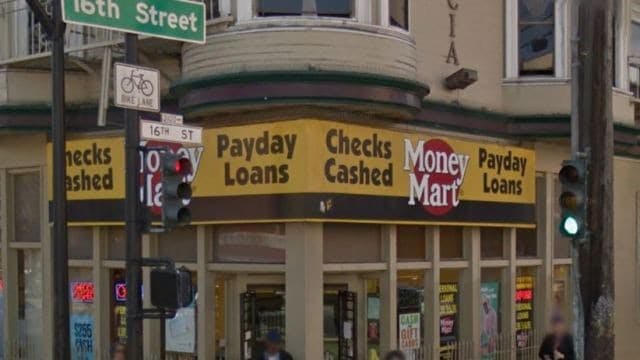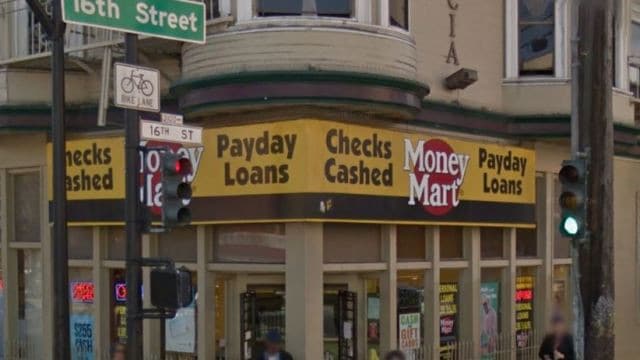
The Bay Area’s poorest residents face hidden costs at every turn
In the Bay Area, 1.3 million residents are too poor to meet their basic needs. One in 10 families must choose between rent and groceries. Parents work three, sometimes four, jobs at minimum wage to provide for their children.
The path out of poverty is littered with roadblocks. Last year, we examined how out of reach everyday necessities feel for those in need through our Poverty Line Prices campaign. But it’s not only about purchasing power — living in poverty affects families’ most vulnerable moments, it strips individuals of options and deprives many of opportunities.
Working hard with tight margins
Since 1980, costs of living have risen faster than wages for many Americans, and earnings have grown more unpredictable. Among the bottom fifth of earners, the majority see monthly income swings of 30% or more over the course of a year (1). High variability on a poverty-line income makes budgeting and saving complex.
Families with unpredictable cash flows and limited means are uniquely at risk: nearly half of Oakland residents lack sufficient savings to cover housing, food, healthcare and transport for three months (2). This jumps to two-thirds among Black and Latinx residents, concentrating vulnerability in these communities.
Without several thousand dollars on hand to cover a security deposit and first month’s rent, many resort to residential motels where nightly rates add up to higher monthly housing costs. People who lack refrigerators or kitchens also spend more on lower-quality food, adversely impacting health and wealth alike. Even something as mundane as toilet paper costs 6% more when you can’t afford to buy it in bulk (3).
The less you make, the more you pay
When individuals or families can’t cover gaps between cash on hand and the things they need, the only viable option is to borrow, and often under extremely unfavorable terms.
Research shows that 45 million Americans have no credit history (4). Without a credit score, large loans like mortgages, auto loans, or student loans are out of the question. Even credit cards can be difficult to obtain, so many turn to what are often predatory cash advances or payday loans. In Oakland, 21% of residents use payday loans to cover gaps in available cash (2). These loans carry an average APR of 391%, compared to 15–20% for most credit cards (5). This can trap borrowers in a cycle of debt — in California, 75% of fees collected by payday lenders are paid by customers taking out numerous additional loans to service rapidly-accumulating interest (5).
People living on tight incomes also face added costs to using money. Intimidated by minimum account balances and steep overdraft fees, 9 million American households go without banking services. An additional 24.5 million households rely on financial products like check cashing services and money orders to access their wages. These services amount to $40,000 in fees over the course of a lifetime (5).
Justice, at a price
Speeding tickets, parking tickets, and other fines for minor offenses are annoyances for most people, paid and quickly forgotten — but when a typical $80 parking ticket wipes out an entire day of minimum wage earnings, it’s not so easy to pay or forget.
In California, driver’s licenses can be suspended for failure to pay fines or fees. From 2006–2011, 4.2 million drivers — 15% of California adults — had their licenses suspended for failure to appear in court or to pay fines (6). Failure to pay fines or fees can land you in jail, which commonly results in lost work hours, further deepening one’s inability to pay (7).
Nowhere is justice more financially fraught than the cash bail system. When a person is arrested and charged with a crime, the court requires that they make a collateral payment before they leave jail to ensure that they will show up to court. In California, 70% of people arrested cannot afford to pay bail, meaning that they can be held for weeks, sometimes months or even years, without seeing a trial (8).
Time spent behind bars awaiting trial can cost a person their job, custody of their children, and, in some cases, their sanity. Even more devastating, of the 1.5 million people arrested on felony charges in California from 2011–2015, 500,000 were jailed without ever being found guilty of a crime (8). Jailing innocent people costs taxpayers ~$9 million per year in San Francisco and Alameda counties alone (8).
So what can we do?
Living on the economic margins means living with added costs and barriers that compound to keep lower-income people anxious and in debt, with limited recourse to build toward a more prosperous future. At Tipping Point, we invest in organizations that help people navigate a system designed without their needs in mind.
Rubicon Programs, a grantee since 2006, provides comprehensive employment and career training services so people in the East Bay can raise their baseline earnings and establish a robust network. Mission Asset Fund (MAF), a grantee since 2012, offers an alternative to low-income borrowers in the form of lending circles. Their model has created a new pathway to credit for thousands of people, and MAF has facilitated over $1 million in loans with a 99% repayment rate.
Deep inequities persist because they are largely invisible to people removed from their direct experience. You can learn more about personal finance at the poverty line from the US Financial Diaries project, which lifts up the voices and stories of people living on the economic margins. The San Francisco Treasurer’s office has compiled its findings on fines and fees + money bail and their recommendations for reducing disproportionate impacts on low-income residents.
We encourage you to join us in supporting the amazing groups working to build a stronger and more just Bay Area. Below are articles to continue the conversation — read, share, and please let us know what you think. When we understand injustice, we can begin to overcome it.
Works Cited
- http://www.strongfinancialfuture.org/essays/the-real-financial-lives-of-americans/
- https://prosperitynow.org/files/PDFs/profiles/Oakland_Family_Assets_Count_Data_Profile.pdf
- https://www.theatlantic.com/business/archive/2016/05/privilege-of-buying-in-bulk/482361/
- https://missionassetfund.org/shadows/
- http://www.economist.com/news/united-states/21663262-why-low-income-americans-often-have-pay-more-its-expensive-be-poor
- http://www.lccr.com/newsroom/la-weekly-unfair-traffic-tickets-put-the-poor-in-a-hole-a-proposed-law-could-fix-that/
- http://www.npr.org/2014/08/25/343143937/in-ferguson-court-fines-and-fees-fuel-anger
- https://www.hrw.org/report/2017/04/11/not-it-justice/how-californias-pretrial-detention-and-bail-system-unfairly
- https://www.nytimes.com/2015/01/19/opinion/charles-blow-how-expensive-it-is-to-be-poor.html?_r=0
- https://www.theatlantic.com/business/archive/2014/01/it-is-expensive-to-be-poor/282979/
- https://www.washingtonpost.com/news/true-crime/wp/2016/06/15/oakland-police-stopping-and-handcuffing-disproportionate-numbers-of-blacks-work-to-restore-trust/?utm_term=.ba00624c2ede
- http://www.usfinancialdiaries.org/
- https://csd.wustl.edu/Pages/default.aspx
- http://www.responsiblelending.org/
- https://inequality.org/
- https://www.fdic.gov/householdsurvey/
- https://www.jpmorganchase.com/corporate/institute/report-paychecks-paydays-and-the-online-platform-economy.htm
- http://www.usfinancialdiaries.org/issue1-spikes
- http://sftreasurer.org/sites/default/files/FINAL%20Fines%20and%20Fees%20Task%20Force%20Recommendations.pdf
- http://sftreasurer.org/sites/default/files/2017.6.27%20Bail%20Report%20FINAL_2.pdf



